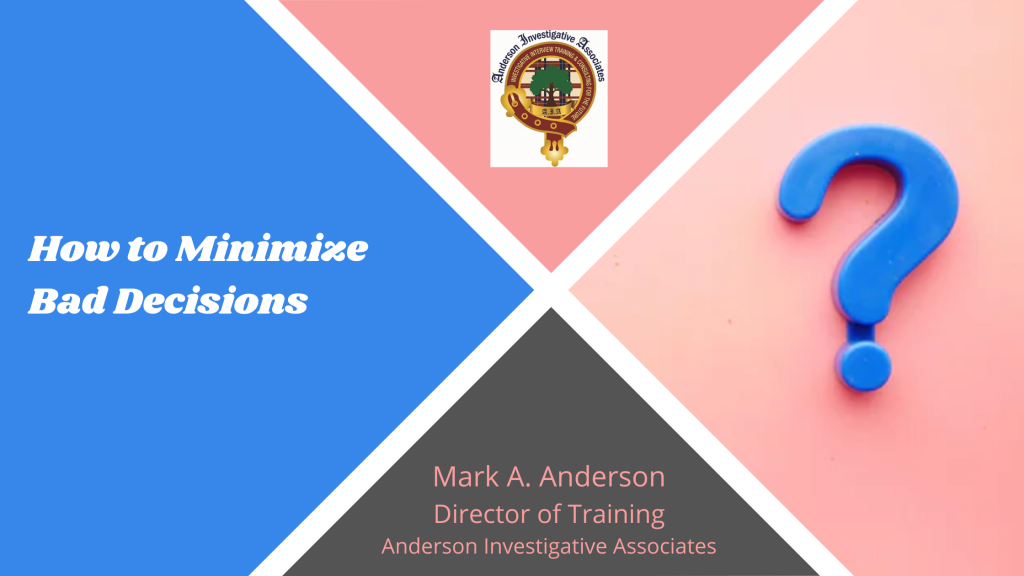
When it comes to the business of investigations, auditing, compliance, inspections and human resources, decisions are a consistent part or our work experience whether in the rank and file or in leadership positions. Honing the ability to make good ones is essential. Part of that is minimizing the bad ones, which is what we will examine now.
Think about your professional responsibilities with investigations, audits, or whatever. Think about the number of cases you have, and the decisions related to each. Then in each one of those break down the number of interviews, document reviews and related responsibilities and how quickly the total number of decisions become astronomical. These decisions affect your results and certainly the ultimate success in what you accomplish here and across the board. We must be consistent and credible in the decisions we make. That consistency and credibility build confidence which is foundational for ongoing success.
There is nobody on earth who can lay claim to never making a bad decision. People make too many decisions for them not to make bad decisions once-in-a-while. I certainly have. Hopefully, those decisions are minor and have little impact. However, there will be occasions where you make a bad decision that has significant consequences.
It’s going to happen. You try to do everything in your power to avoid these bad decisions. Perhaps, all the information you needed was not available at the time you made the decision. Or someone provided you the wrong data, whether intentionally or not. It’s possible you made a rash decision without giving much thought to the consequences of the decision. Whatever the case, the result may turn into an unpleasant and stressful situation requiring correction and maybe making necessary amends.
You need to face up to the consequences. Take ownership of the decision and don’t pass the blame. It’s possible you will have to deal with someone if they didn’t give you the right information or deceived you in some manner. Their action may be the cause of the wrong decision, and you must choose if you need to address that person and the situation as a result. However, if you were the one that was responsible for making the final decision, then the consequences of that decision rests with you.
Stay confident and don’t panic. Examine what happened and why. Then, try to find ways to reduce the impact of your decision. If it is a business decision that costs your company some capital, be it financial or reputation, make sure you let your management know about it right away. Don’t try to ignore the problem thinking that management may not notice. They will be upset when a mistake costs the company capital. But they will be even more upset if you don’t make it known in a timely fashion. Good communication is essential. You may not have seen this modeled by those above you……but it is the right thing to do.
Continuing in the theme of good communication, don’t be afraid to talk to someone who may be able to help with the situation. It could be your boss, a colleague, or a mentor. They may be able to shed some insight into the situation. In fact, you could be blowing the situation out of proportion, and they will know how to move beyond it. However, they can only help if you give them timely and complete information about it.
If the situation requires presenting your case to higher-level management, try to prepare alternatives on how to reverse the situation or reduce the impact. If these managers see that you have taken control of the situation, they may decide to let you run with the alternatives, although probably with a watchful eye of those superiors.
Now, having read this, you are examining in your own mind several decisions that you have recently made. Some may be good, some, not so much. In either case, you see the importance of planning, strategizing, and communicating the process that led to your decision. Working at this will result in the process being easier and your confidence being higher. Learning to do this will help to prepare you for future assignments and promotions. And regarding promotions and leadership; please don’t forget from whence you came.
Anderson Investigative Associates is positioned to custom-tailor training to your specific needs. If you have any questions or would like to discuss the above issues of minimizing bad decisions or any training need, please reach out. Additional issues pertaining to interviewing, auditing, and investigations can be found in other blogs and videos that are on our website and LinkedIn. This material is also contained in most blocks of instruction that our company presents in training nationwide.
If you have additional questions, comments, or have an interviewing topic you would like me to address, give me a shout. In the meantime, be well, stay safe out there, and start optimizing good decisions and minimizing poor ones. Practice makes perfect and confidence grows.
Mark A. Anderson
Director of Training and Development
Anderson Investigative Associates, llc
114 Loucks Avenue
Scottdale, PA 15683
manderson@andersoninvestigative.com
tel:912-571-6686
.
